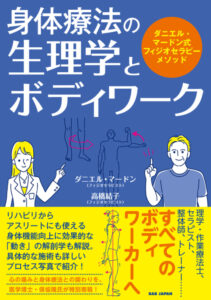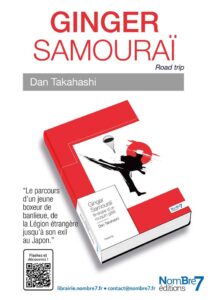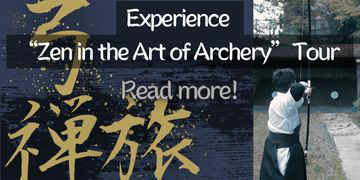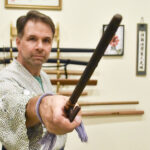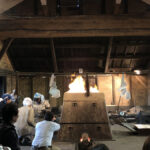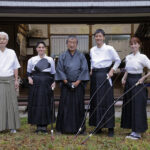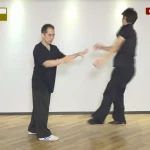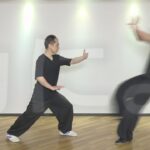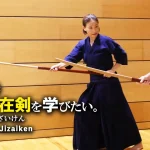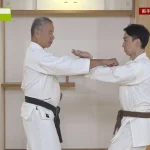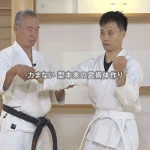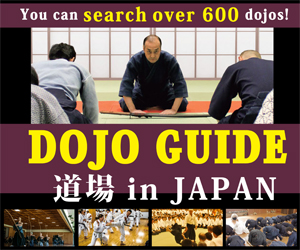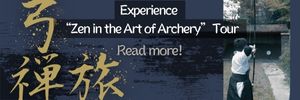【Exploring the spirit of the Ryukyu】Series 4 (HIDEN 08/2023)「Machida Hatsuko SENSEI」
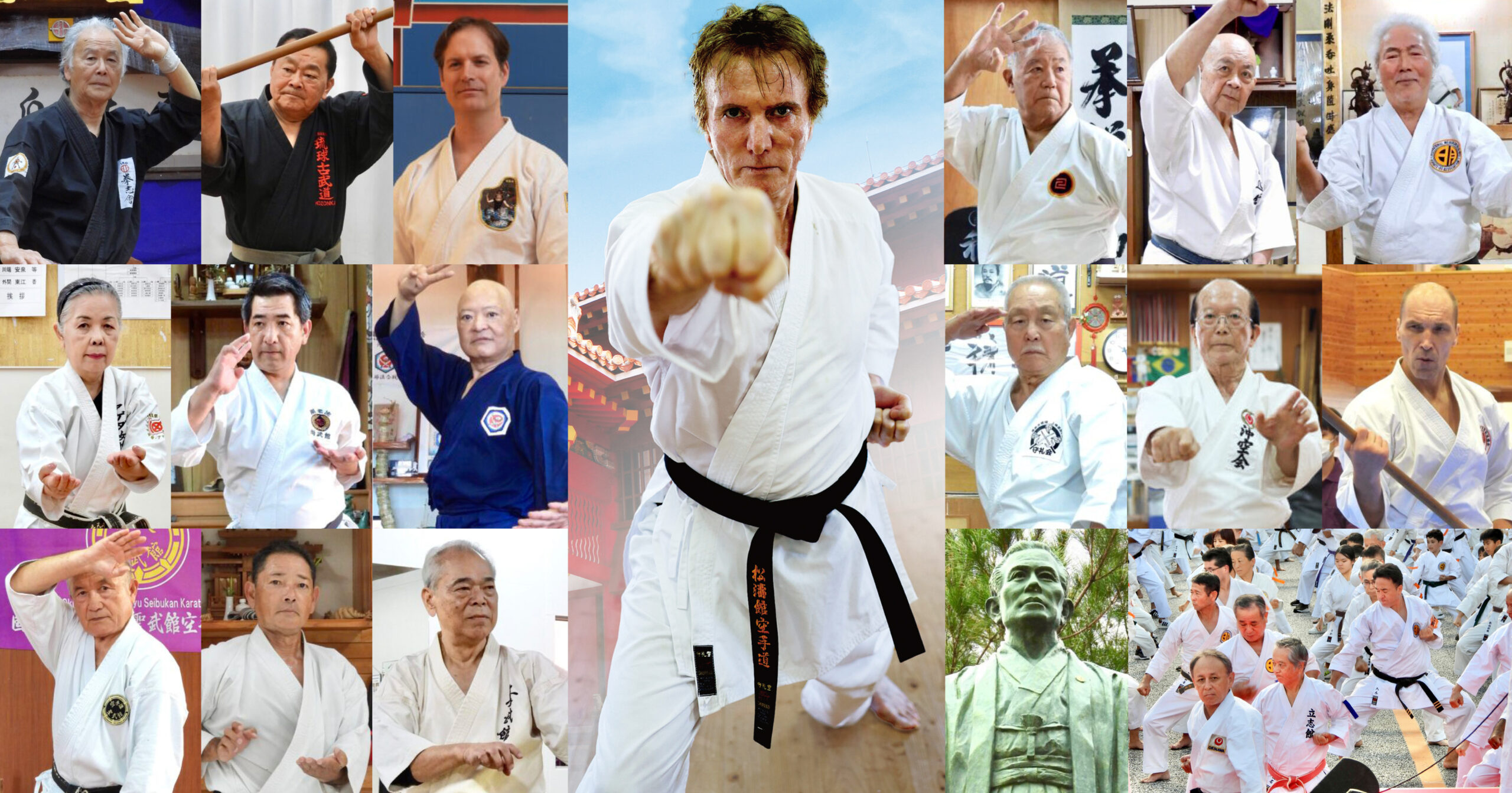
AGEDA COMPANY DOJO & DOJO FOR WOMEN
Again, this time, we are visiting a one of a kind place.
After 10 years of practice at her own Company-Dojo, Hatsuko Machida Sensei opened the “Ageda Women’s Dojo” in the late 90’s. She was the first in Okinawa prefecture to teach to women only. Her students are renowned for performing demonstrations overseas, especially in Hawaii and New Zealand. Several have won titles at the 1999 World Karate Tournament.
“I wanted to open the door to women who were not good at sports,”

The facade of “Ageda Air Conditioning Food Equipment Co., Ltd.” Ageda Women’s Dojo and Ageda Employees’ Dojo occupies the entire top floor.
The company Dojo has been built at the top of a 4 story building standing against a hill in beautiful scenery, with a view of the China sea. The access is provided by a primary entrance from a park on the top of the hill. A large inside stairway and a small outside staircase lead to offices on lower floors and make the place look like a “Donjon”. At the bottom, a big parking lot with trucks and a loading dock shows us that we are indeed in an industrial building.
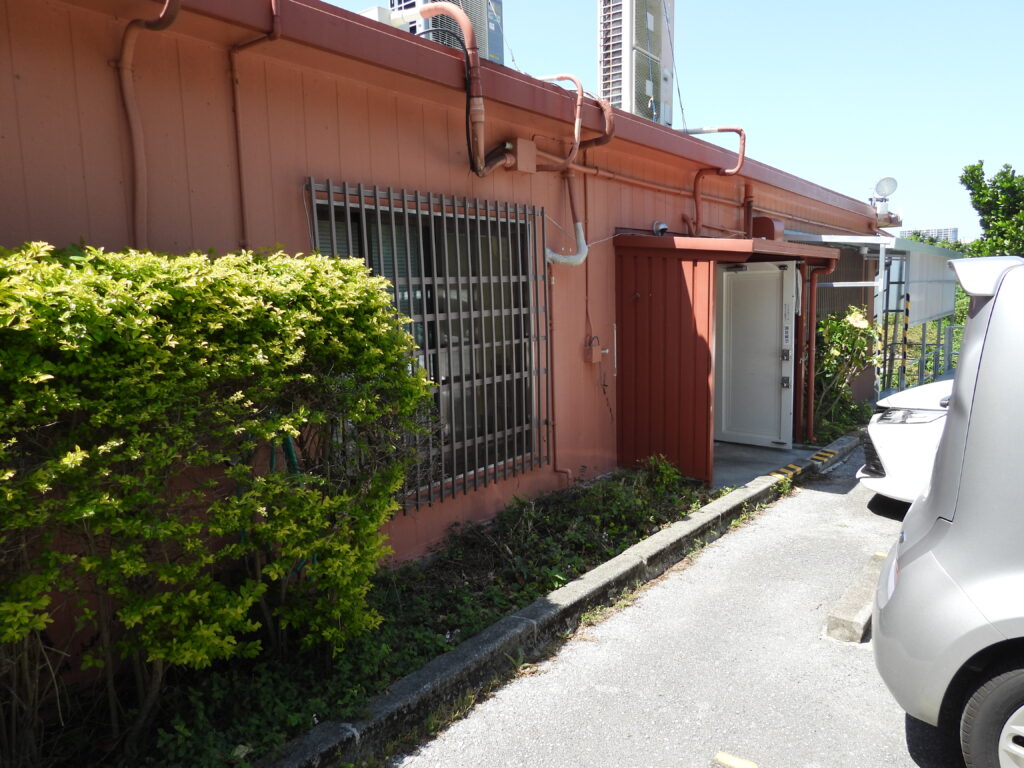
Main entrance from the hill-side.
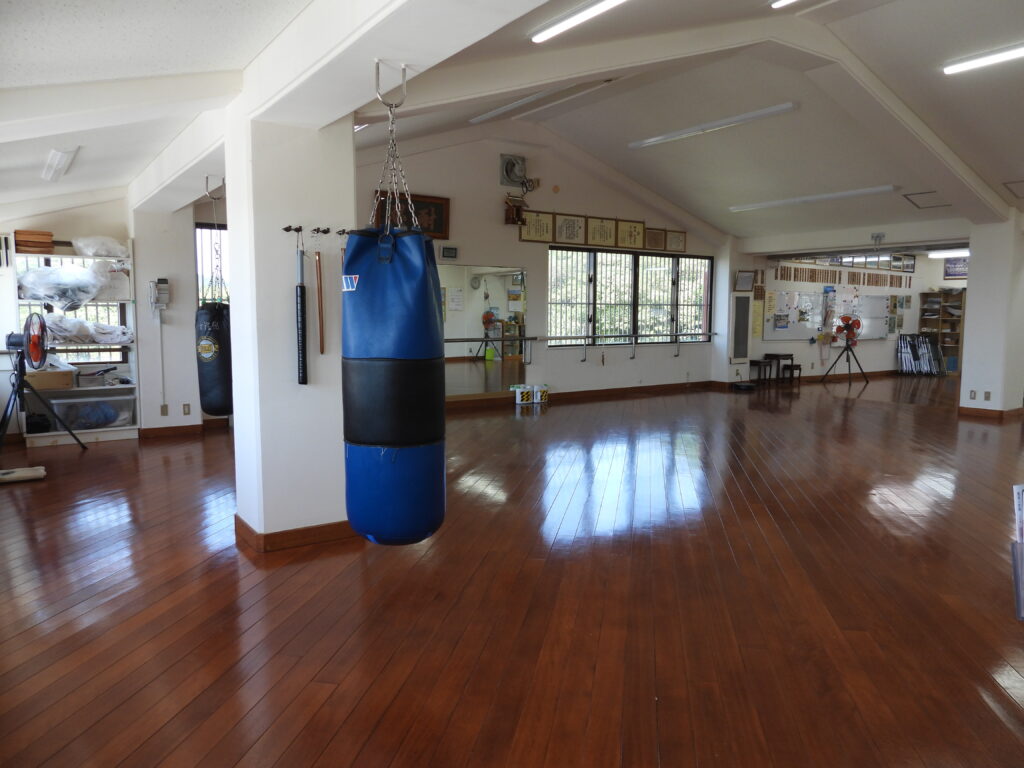
A 35 years old Dojo where a lot of special disciples have been trained.
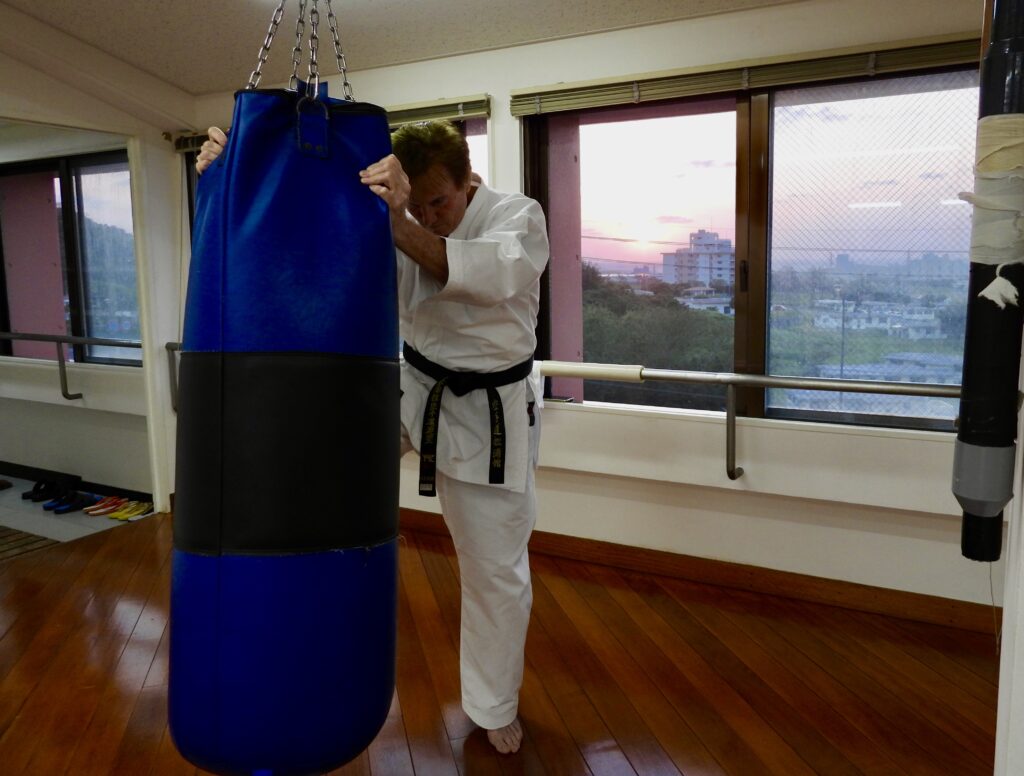
Dojo view with Sunset over China sea.
At the women Dojo, most are high-level black-belts in their 40s to 60s and gather twice a week. Tonight, despite the Covid is still at the highest level of all the Prefectures in Japan, we have a great attendance. Some of the ladies have been faithful from the very beginning…. It is amazing to see such a passion. The silence gives a monastic feel compared to other Dojo. I am exceptionally allowed to take this class and probably the first man ever seen among this group.
I will never forget this unique experience.
A feminist slogan from the 70’s was saying; “Behind every great man there’s a great woman”.
If this is often true, the opposite is also true.
When her husband, Machida Soukei Sensei, started the construction of his company building in the 80’s, he already had the intention to make a Dojo to provide corporate Karate classes for the employees. This would allow to put in practice the 10 precepts (Jikkun) usually implemented in Japanese companies, such as devotion, perseverance, support, moral virtue, etc…,.Since these principles mostly focus on success, Machida Sensei decided to include his own philosophy about health and happiness as well as some discipline based on Bushido rules.
I had to come back another day to see the employee’s class. I came early and I am hitting the bag while watching the most beautiful Sunset on the China sea… Suddenly, a bunch of black-belts penetrate the Dojo from the inside stairs and the small corridor. The atmosphere is much friendlier and more relaxed. However, when Machida Sensei enters, we feel that the CEO-Sensei is very respected. The class is amazing (Kihon-keiko, Sanchin and 8 Kata) and shows a super bond among the team. The warmth and the personality of the Big Boss makes you want to join the company! This is beyond my expectations!
This time, we need to share the interview with both Sensei.
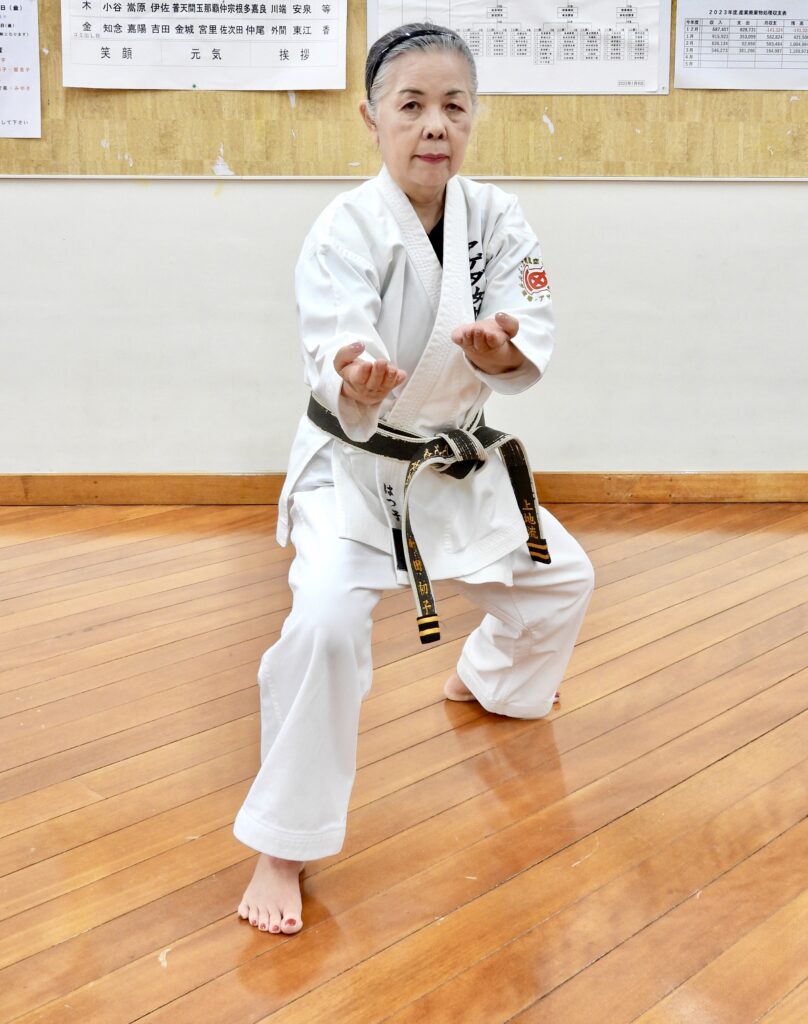
Biography of Hatsuko Machida
Ageda women’s Dojo Kancho. Uechi-ryu Kyoshi 7th Dan.
Auditor of Ageda Air Conditioning Food Equipment Co., Ltd. Born in Okinawa City in 1949.
She started karate in 1989 and in 1999 she opened “Ageda Women’s Dojo”. Still active now.
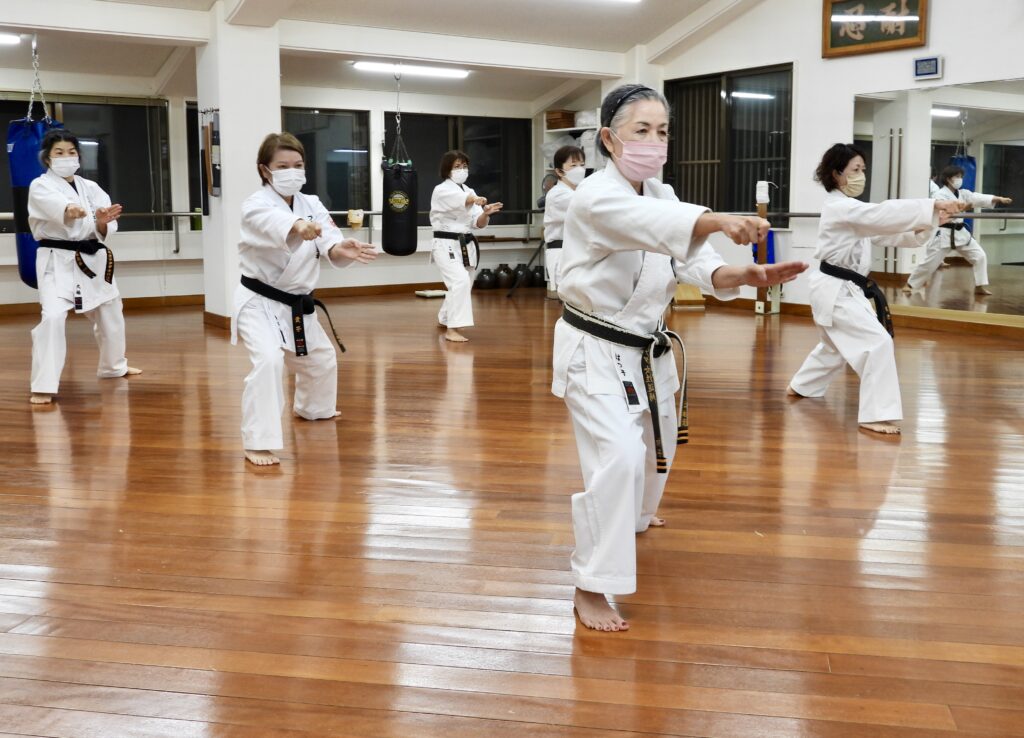
Practice of Uechi-ryu kata “Kanshu”. Every time they took a step on the floor, a powerful sound echoed through the Dojo.

Soukei Sensei (right) instructing Kata. Shoken is a striking technique that protrudes the second joint of the index finger and strikes the vital point.
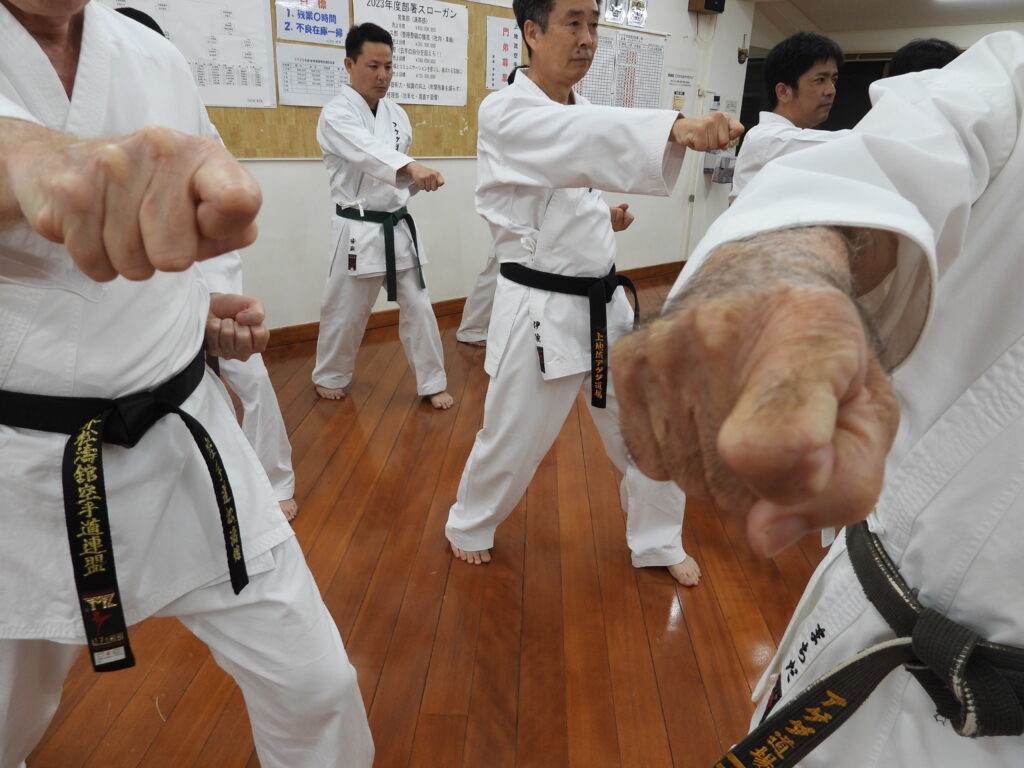
Demonstration of the “Shoken”.
(1-) How did you start karate?
Hatsuko-sensei:
I really started when my husband Soukei established a karate Dojo in our company. I became his number one apprentice.
Actually, I had never practiced any regular sports before and I always thought karate was for men only. Since I was not in great physical shape, I started softly, thinking that once a week would be enough to move my body. I had turned 40 and it was after the busy period of raising children. I continued my practice at both my husband’s Dojo and his Sensei’s; Shigeru Takamiyagi, who was running the famous “Chatan Dojo”. Thus, I have two “Shisho”…
Soukei sensei:
After being unable to defend myself during an aggression while coming back from night school…! I immediately signed up at a Goju-Ryu Dojo. Since no kumite was taught, I switched to a Shorin-Ryu Dojo, but it seemed that it was all about Kata at that time and I wanted to find a quick way to learn how to really fight. The very popular Funtenma Dojo (Shubukan) which opened in 1958 and was run by Uechi Kanei (1911-1991) had a great reputation for training fighters. Okinawa had a mix of superiorly built Americans versus smaller Okinawans. At that time the kumite were often turning into bloody fights between the 2 communities -Okinawans refusing to lose face in front of the invader- However, at Funtenma Dojo, strong friendship and respect for each other became also a trademark. The day I entered the Dojo, I was 20. Sweating in the Dojo were 3 assistants; Takara Shintoku, Inada Hiroshi and Takamiyagi Shigeru… They all became Hanshi 10th Dan and my friends.
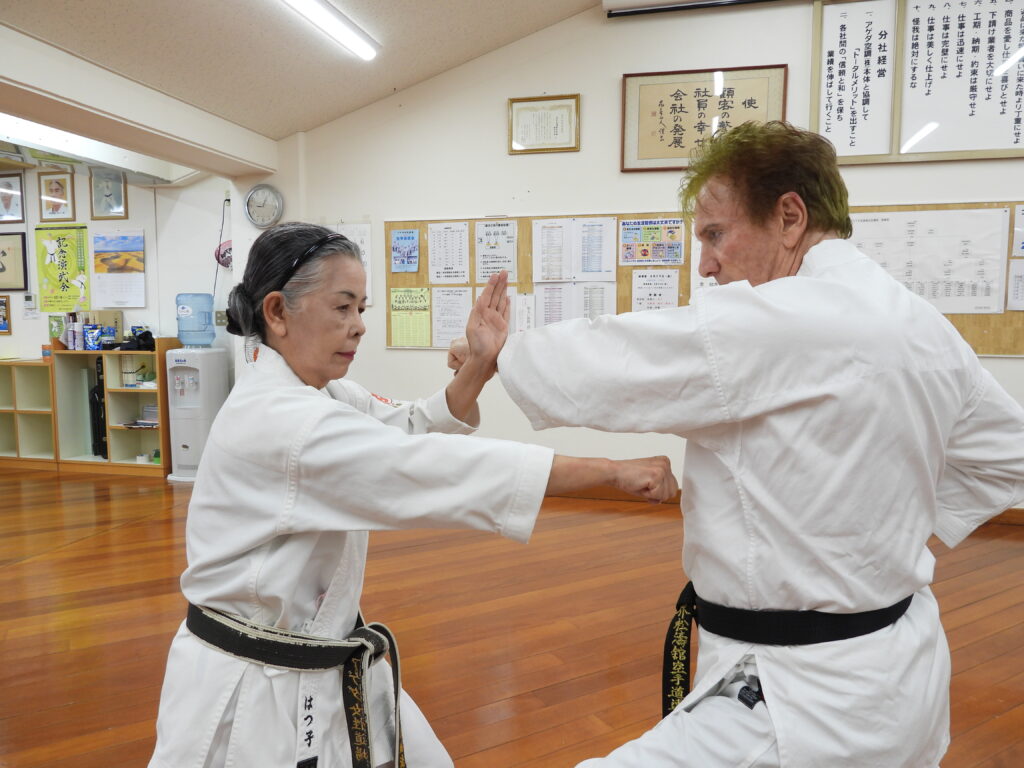
Hatsuko-Sensei blocks Daniel-Sensei’s tsuki and counteracts with a shoken tsuki.

Block and counteract with the characteristic Uechi-Ryu “Mae-geri” using the tip of her toe.
(2-) What are the characteristics of your school (dojo)?
Hatsuko-sensei:
Spreading traditional Okinawan karate to women in the prefecture at a women-only Dojo. I used to be a very fragile woman who didn’t like to sweat, but I discovered the practice of Kata and Kumite with men, leading to having my arms and legs full of bruises. My friends were very surprised. So when a person comes to my Dojo saying; “I don’t exercise” or “I am not good at exercising”, I tell them, “If you keep coming, you’ll be fine.” I have a wonderful disciple who started at 63 and passed the 4th dan exam at 75.
(3-) What is your specialty?
Hatsuko-sensei:
Among the 8 katas of Uechi-ryu, my favorite one is “Sanseiryu”.
(4-) What is your most impressive memory of your teacher?
Hatsuko-sensei:
I was instructed by Takamiyagi Sensei to spread karate to women. When I told him that I wanted to open a Dojo for women who were hesitant or giving up even though they wanted to learn, he said, “If you have the desire to spread Karate, why not try it? It is your mission!” he also said; “It’s time to get promoted to 4th dan”. I was able to open Ageda Women’s Dojo because of both the kindness and strict discipline of Takamiyagi Sensei and my husband’s support.
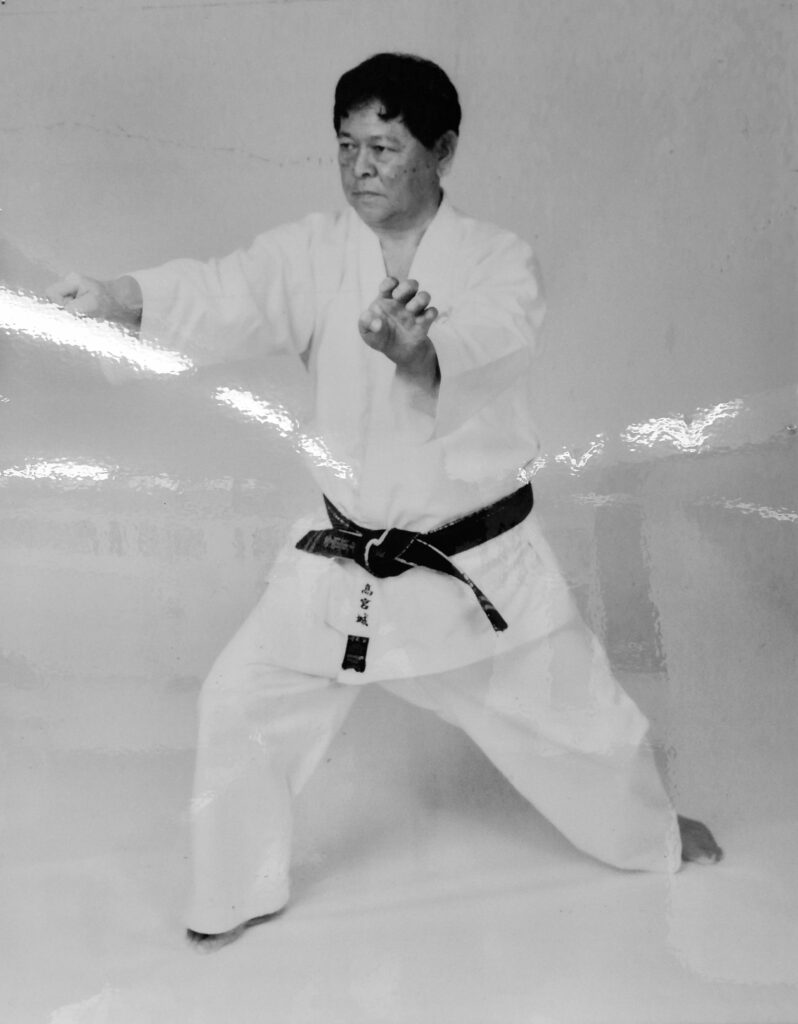
Uechi-ryu Hanshi 10th Dan, Takamiyagi Shigeru Sensei (1935-2014). He was the teacher of the couple and a friend.

Hatsuko & Soukei Sensei with their first daughter Maki (1973)
(5-) What is the difference between Okinawa karate and mainland karate?
Soukei sensei:
Each school has its own characteristics, but when it comes to Uechi-ryu, the essence (shinzui 神髄) is the same in both Okinawa and mainland Japan. And I think that’s the way it should be.
(6-) Do you often teach foreigners?
Hatsuko-sensei:
In the past, but not now anymore. As for overseas seminars, Takamiyagi Sensei was fluent in English, so he often visited Uechi-ryu branches abroad. He accompanied us to various countries such as the United States, Switzerland, Germany, Yugoslavia, and Serbia.
Soukei sensei:
Currently, all of my disciples are employees, but in the past, many international students from the University of the Ryukyus who were interested in karate came to my Dojo. Takamiyagi Senpai, who was a professor at Okinawa International University, brought them to my Dojo. At Takamiyagi Senpai’s Chatan Dojo, there were people from the U.S. military stationed in Okinawa and alsoKarateka from Yugoslavia and Serbia. I was his assistant.
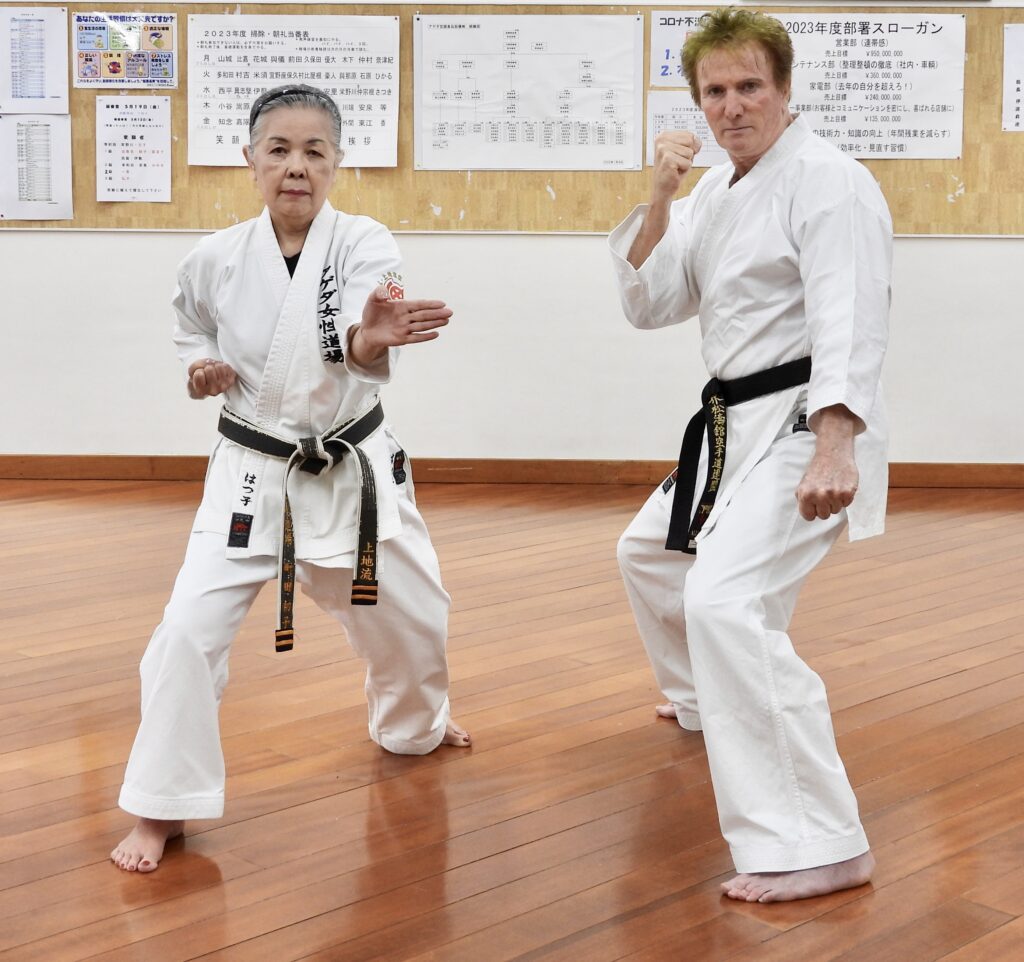
Two different positions from two different styles.
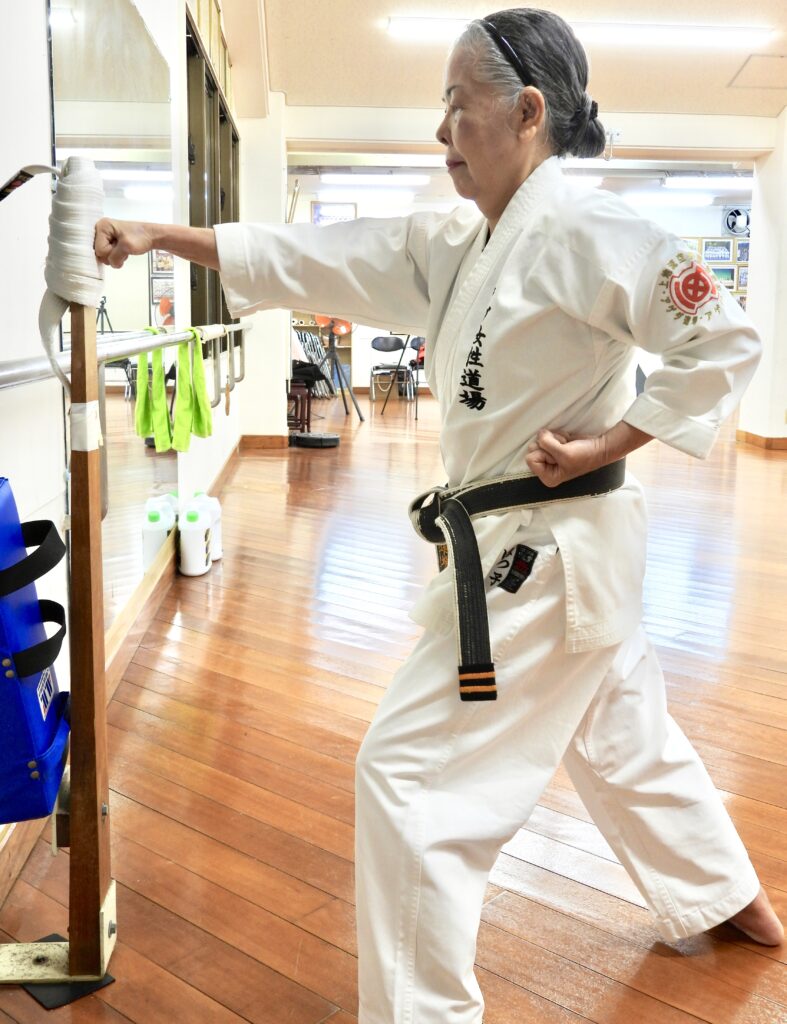
Training at the traditional Makiwara.
(7-) What are your thoughts on the global rise of karate today?
Hatsuko-sensei:
As an Okinawan, I am very happy that karate is spreading all over the world.
(8-) What do you think about karate becoming a competitive sport, including the Olympics?
Hatsuko-sensei:
I think it’s a good thing that karate has attracted the attention from all over the world at the Tokyo Olympics, but the essence (shinzui神髄) of Karate-Do, might not be respected if it becomes a sport.
Soukei Sensei:
Reisetsu(礼節) (courtesy, manners) will be very difficult to teach; especially to children when competition will become more popular. It is normal that young people want to test how strong they are. However, once you move up the ranks and become a black belt, you don’t do that anymore. Courtesy is something you learn as you grow.
Also, the length of time it takes to take the promotion test varies from Dojo to Dojo. In our Dojo it takes 4 years to complete shodan, but there are places where it takes less. We believe that regularity of training is also important in the process of mental and physical growth.
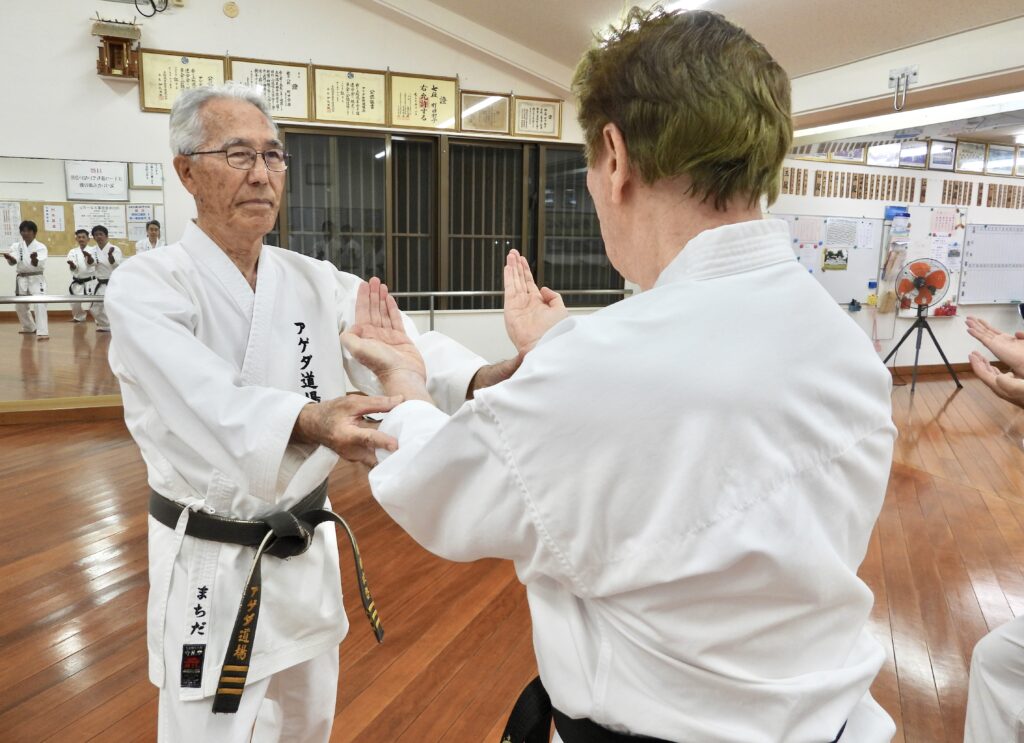
Soukei Sensei correcting Daniel Sensei on an important Uechi-Ryu’s technique.
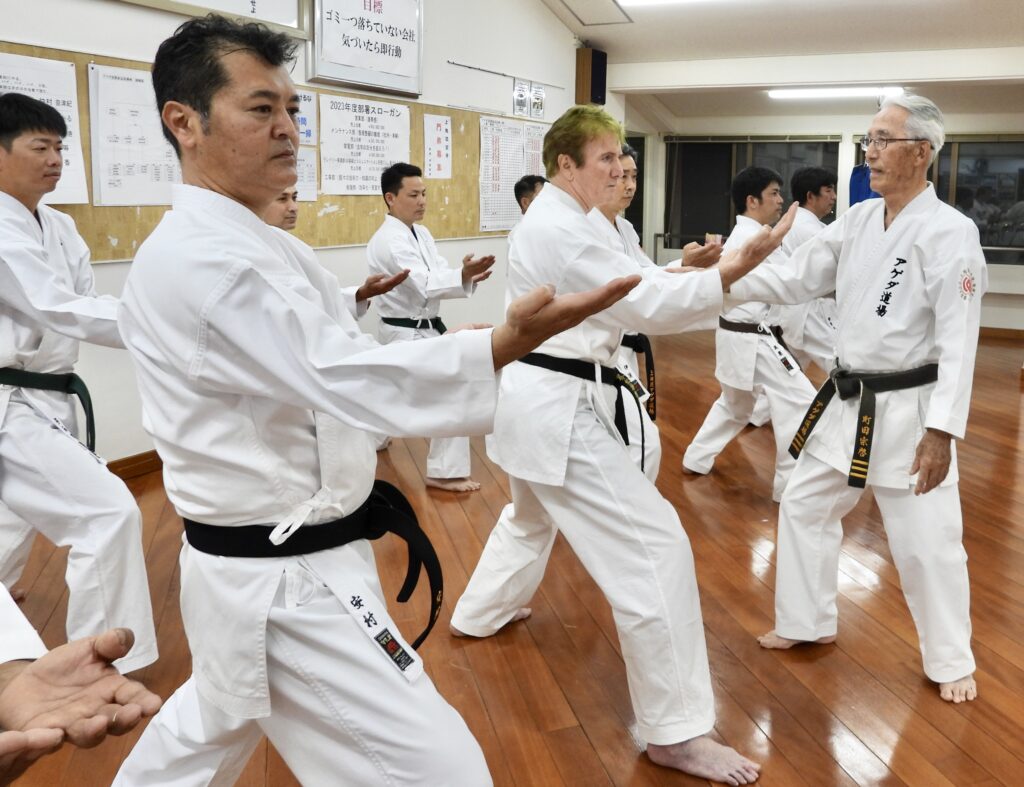
Soukei Sensei is a very attentive teacher.
(9-) What is the significance of engaging in karate as a martial art in the current era?
Soukei sensei:
Nowadays, there is no respect for life and the weaker, like children, women, and the elderly become victims of violence. This happens less in places familiar with the practice of Budo. Karatekas rarely commit crimes. I think there is great significance in inheriting Martial-arts Karate and passing it on. (Machida Sensei doesn’t say “Karatedo”, but rather use “Martial-arts Karate)

Kata practice of “Seisan”, which requires explosive power and fast movements.

A beautiful high ceiling Dojo.
(10-) How do you envision the future of karate?
Hatsuko-sensei:
I want my disciples to take over and increase the number of places where women can learn traditional Karate. I also want to focus on training Karate instructors.
(11-) Do you have any message for the world?
Soukei sensei:
My resentment towards the person who had beaten me when I was 20 has turned into gratitude for having led me to Karate. I want to build a peaceful world with martial arts, which emphasizes mental and physical training and courtesy. “Martial arts Karate” has nothing to do with talent, age, gender, beauty or ugliness. It’s enough if you just have the ability to persist and continue the practice.
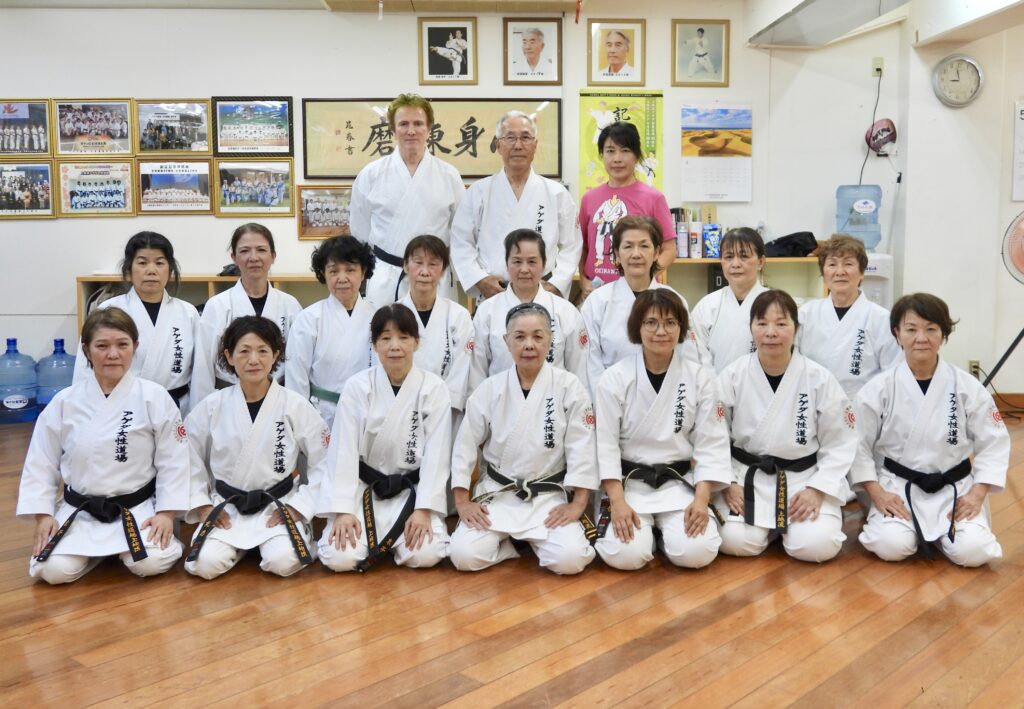
Members of Uechi-ryu Ageda Women’s Dojo.

“Ageda Employee Dojo” members.
(12-) What does “karate” mean to you?
Hatsuko-sensei:
Part of my life… On training days, I come here no matter what and how I feel, unless there is a very good reason.
Daniel Sensei’s final words:
The two of you have lived a wonderful life through a series of synergies and happy events. I am deeply moved by this visit to your unique Dojo and concept. You are giving power to women as well as great services to your clients who can feel and trust a well-educated staff. Thank you very much.
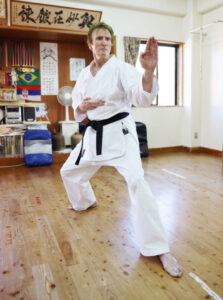
Daniel Mardon; the Karateka-Therapist
Creator of Aromapressure® method and physiotherapist with a valid US license, Daniel Mardon was born in Paris. One of his specialties is to teach and to perform lymphedema and subcutaneous tissue-damage care, after radiotherapy for cancer patients at medical institutions and subcutaneous tissue-circulation stimulation before and after surgery.
He was also a therapist for two famous soccer teams in Paris. Since 2005, he has focused on producing top-class hotel spas in Japan, as well as physiotherapy education and awareness-raising activities for health care professionals. Author of several books, among his major publications includes “The Physiology and Bodywork of Physical Therapy ” (Published by BAB Japan) and DVD “Daniel Mardon Aromapressure® Method ” (Pony Canyon). He regularly appears on television and radio shows, and has featured in numerous media publications.

